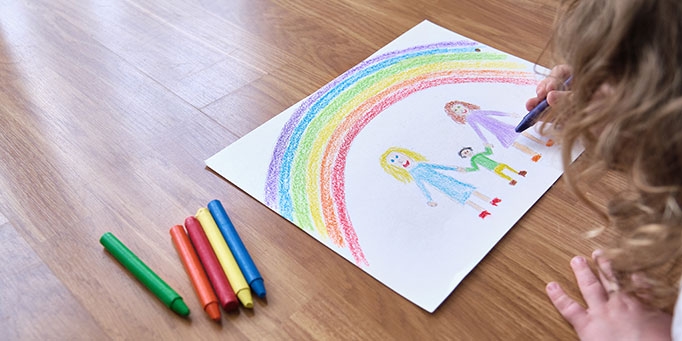
Mum, did you know Penny Polar Bear has two mummies?
Peppa Pig and preparing our kids for cultural engagement.
I still remember the day when my son came home from Kindergarten and declared to me: ‘Mummy, did you know men can marry men and women can marry women?’. It was 2017, before the Australian marriage plebiscite, and the statement wasn’t yet true. But the implication was nevertheless correct: my son is growing up into a world where he will have to defend his Christian faith and values at a much younger age than I did.
The source of my son’s newfound knowledge was a girl in his class. But in the five years since, these messages aren’t only coming from the classroom, they’re being broadcast or streamed right into our kids’ TVs and tablets.
Last week, perennial favourite cartoon Peppa Pig aired an episode called ‘Families’. In this episode, Peppa and her friends (and the viewers) are introduced to a new character—Penny Polar Bear and her two mums.
The inclusion of these characters may be a response to a petition launched at the show’s creators which argued: ‘Children watching Peppa Pig are at an impressionable age, and excluding same-sex families will teach them that only families with either a single parent or two parents of different sexes are normal.’
For an indication of how much the world has changed in the last 20 years, we can contrast the widespread acceptance of this Peppa Pig episode with the outrage that occurred when a 2004 segment of ABC’s Playschool showed a girl with her ‘two mums’. At the time, then-Prime Minister John Howard criticised the ABC for ‘running an agenda in a children’s program’.
Both sides of the debate agree that children are impressionable. What they see on television does shape their view of what is ‘normal’. So where does that leave Christian parents who are aware of the barrage of cultural messages being shouted at their children—on TV, in the playground and potentially in the classroom?
Reflecting on raising my own children (now 11 and 7) in this context, here are some ways I am trying to equip them with the ability to understand how they fit as ‘aliens and strangers’ in this increasingly foreign world.
1. Know the best story
Making sure that my sons know the best story—the gospel—is a lifelong work that a good friend of ours (and our #2’s godfather) encouraged us to begin as early as we could. For us, that was establishing a night-time Bible reading habit from as soon as he had a ‘night-time’ (that is, as soon as he started sleeping through the night).
One thing that is particularly special for me as I see my sons grow is to know that they know the Bible so much better than I did at their age (I only became a Christian once I went to high school).
Never underestimate the accumulation of daily habits. As James Clear, author of Atomic Habits writes, ‘We naturally make longterm changes in our lives by slowly and slightly adjusting our normal everyday habits and behaviours’.
As a mum who has skipped her fair share of bed-time Bible-reading times, it’s hard to see the long-term impact in the moment—especially at the end of a long day when the kids are being silly and you’re wiped from juggling work/home duties. But allowing God’s word to be written on your children’s hearts as they grow will help them know that no matter what other stories they hear in the world, God’s story is the best.
As we read the Bible together, we can also tell our children the ‘best story’ of God’s vision for marriage and family. In God’s world, only one man and one woman can ‘be fruitful and multiply’ together. And the institution of marriage is his way of protecting the children they produce, giving them a stable home and daily access to the two people whose union created them.
(This article from the children’s rights organisation ‘Them Before Us’ explains more about how growing up with their biological, married parents meets children’s needs https://thembeforeus.com/children-have-needs/.)
2. Understand contrasting stories
My friend shared with me a reflection from her son who has just started high school this year. For the first time in his life it struck him: ‘We’re in the minority, aren’t we mum?’.
Of course, the percentage of Bible-believing Christians has always been a minority in Australia, but the percentage of ‘cultural Christians’ was historically high. However, it only takes a glance at statistics from the last few Australian Censuses to see that the era of cultural Christianity is coming to an end. 38.9 per cent of Australia's population reported having no religion in the 2021 Census. This was up from 30 per cent in 2016 and 22 per cent in 2011.
This change in culture will be reflected increasingly in contrasting stories like those seen in Peppa Pig this week.
With very young children, you may decide not to expose them to ‘diverse’ families on television or in library books if you think they are not old enough to understand.
But once children are getting ready to enter the world of school, you can simply ask questions to help them identify how the story they have heard in the playground or saw on TV is different from what God’s word teaches.
When my sons recently watched the movie Lightyear, which also contained a depiction of a same-sex couple, we asked: What did you think about that?
It led my sons to have questions—and their questions may be different from the questions your children have. For my sons, who are aware of where babies come from, they couldn’t understand how this couple could have children. As my children are also IVF-conceived, it was easier for us to explain it to them than it may be for others.
We can explain the biological fact that however they were conceived, every child has a mum and a dad—you can’t make a baby without both of them. But some children don’t get to know or live with their biological father or mother. Isn’t that sad?
This led us into a conversation about the different roles of mums and dads and the strengths that daddy brings in contrast to the strengths that mum brings. One example in our family is that daddy is great at encouraging the boys to try new (and sometimes scary) things like learning to ride a bike or start Karate lessons. Whereas mummy is great at keeping the boys safe (and giving them hugs when they’ve come off their bikes!).
(You can learn more about the different, complementary roles of mothers and fathers in this article from ‘Them Before Us’ .)
Asking questions and listening to our children’s own questions as they engage with our culture is a helpful step in training them to be cultural-critics rather than accepting it at face value.
3. Engage with grace
It’s here that the first two boxes of the gospel presentation ‘Two Ways to Live’ are so helpful.
God is the ruler of the world
He made the world
He made us to rule his good world, giving thanks and honor to him.
This is how God created things to be. But it’s fairly obvious that this is not our experience of the world now. What happened?
We all reject God as our ruler by running our own lives our own way.
By rebelling against God’s way, we damage ourselves, each other, and the world.
This is the explanation for not only why the world is the way it is, but why more and more stories like Penny Polarbear will soon be seen in children’s entertainment.
This is where we have been encouraging our boys to engage with grace. When we see a story like this, we want our boys to see not universal condemnation, but that there are many in our world who are not living with God as their King. The result of this is that they make choices that are opposed to God’s good way. Sadly, many children suffer the consequences of the choices that their parents have made.
The next step is key. We want our boys to know that what we want for these people is that they accept Jesus as their king. This will be essential as they go into high school and will likely have friends and classmates who decide to publicly make stands that, as Christians, my sons won’t agree with.
We want our sons to be ever holding out the gospel of grace and the offer to come under the kingship of the Lord Jesus as the priority over anything else. As a Christian family, we can also share God’s love by inviting our children’s friends—especially those from broken or motherless/fatherless homes—to come and experience the blessing of family the way God intended it to be.
These steps aren’t foolproof. And I’ll admit I am still well and truly wearing L-plates when it comes to navigating my sons through this long and windy road of cultural critique. But I hope and pray that my reflections can help you as you travel along the same rocky terrain with your children.
---
Before training for ministry, Jenn taught courses in English Literature, History and Cultural Studies at universities in Australia and China. Jenn’s former ministry roles were in SRE, and she was a member of Youthworks' Ministry Support Team until December 2021. Jenn now serves as the Children’s Minister at Jannali Anglican Church in the South of Sydney where she lives with her husband and two children.

Families in God's Plan
From beginning to end, our lives are profoundly shaped by our family ties to those who came before us and to those who will come after us. The world around us offers loud and ever-changing opinions about what a family is and what it is for. But it is only by listening to God—who designed the human family in the first place—that we can build a strong and secure foundation for family life.
For more articles from Growing Faith, subscribe to our monthly e-newsletter.
To hear about the latest books and resources from Youthworks Media, subscribe here.








